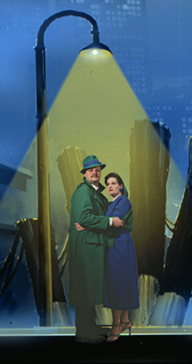
ONE-ACT OPERATIC FILM NOIR
Piano Detective
Music & Libretto by Philip Seward
Developed with Mezzo-Soprano Natalie Arduino

It’s a dark and stormy night…
on a deserted wharf in New York harbor. Detective Dick is waiting to meet his client, a dame, who called his office earlier that day to set up a rendezvous. She arrives slightly disheveled and mysterious, to report the theft of her cadence. She is the famous cabaret singer, Cadee Bad, who is in distress because someone has heisted her cadence and she cannot perform her act.
Detective Dick calms her down and begins to piece the puzzle together by taking notes on his piano. The two put together a list of suspects, including Corelli Clash, Picardy the Third, and Flator Sharp — the archnemesis of Detective Dick. Unwilling to consider that he might be up against such a foe, Cadee and Dick consider the other two suspects Þrst. Unfortunately for Dick, it soon becomes clear that Flator Sharp must be the thief.
In an aside, Cadee reveals that she is actually in love with Flator Sharp and has been given an assignment to kill Dick. At the same time, she begins to feel a growing attraction for the hapless detective. Sensing that attraction, Dick realizes that she must be in love with him because she has heard of his exploits. Astounded by his arrogance, Cadee resolves to fulfill her mission and in a musical turn of events, leaves him slumped over his piano at the end of the show as she rushes off to meet her one true love, Flator Sharp.
Production History
Originally produced at the Chicago Stages Festival in 2000, Piano Detective is the first in a trilogy of one-act operas created by Mr. Seward for two performers, one of whom plays the piano. The women’s roles in the other two acts, Piano Princess and …And Piano Make Three, are written for lyric and coloratura soprano, respectively, with Piano Detective written for mezzo-soprano. Thus, the woman’s voice becomes increasingly higher from act to act. In addition to the casting, several other commonalities bind the three acts together. In each case, the man is named a variation of Dick (Rick and Richard); two common musical motives — heard here as “Yes, Corelli and I had a ball, though we weren’t quite harmonious!” and “Nothing’s so helpless as a dame…”; quotes from the works of William Shakespeare; a use of film genre — here, film noir, in the second act, fantasy, and third, romantic comedy; music which arises comedically out of the situation; and, finally, a whimsical, “over-the-top” focus on some aspect of music. Each work can play separately or as a trilogy with an Epilogue (which takes place in the mind of a composer).
Piano Detective has been onstage in Chicago and Dallas.